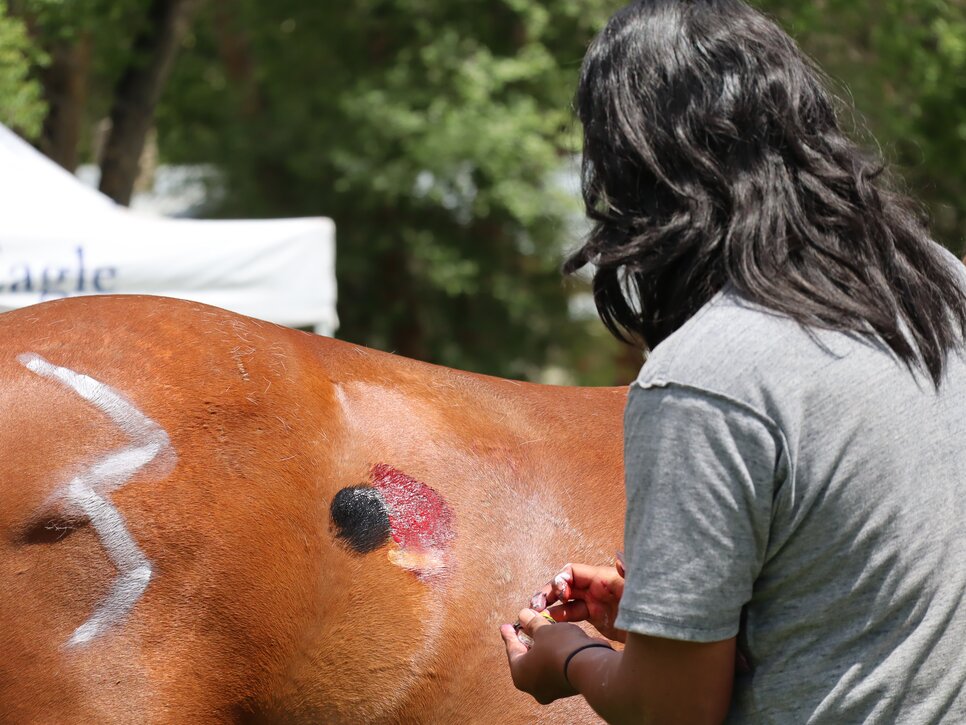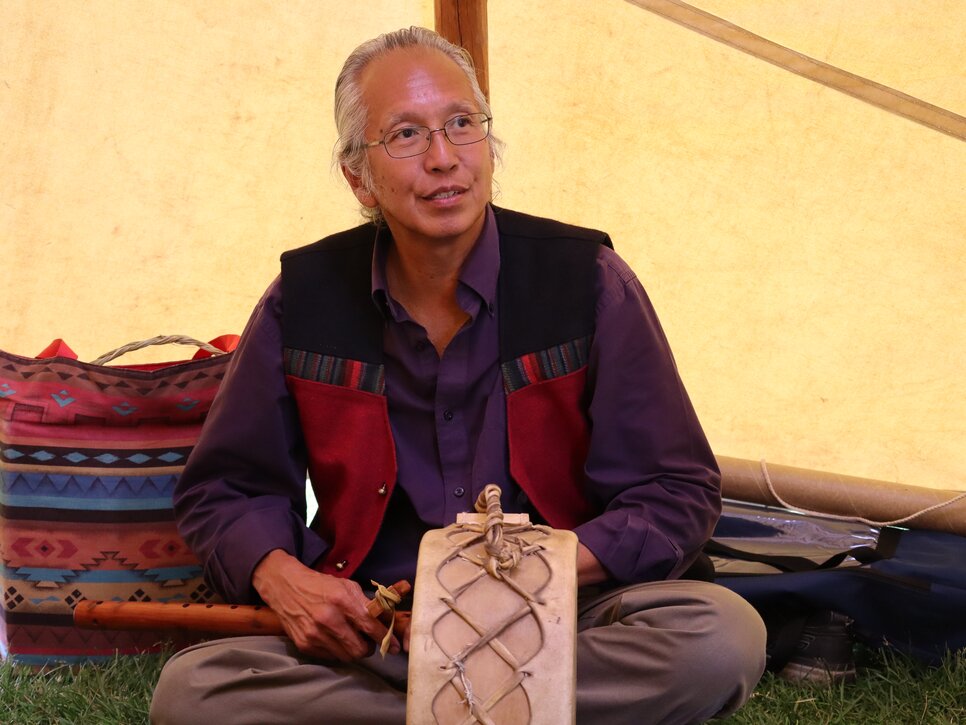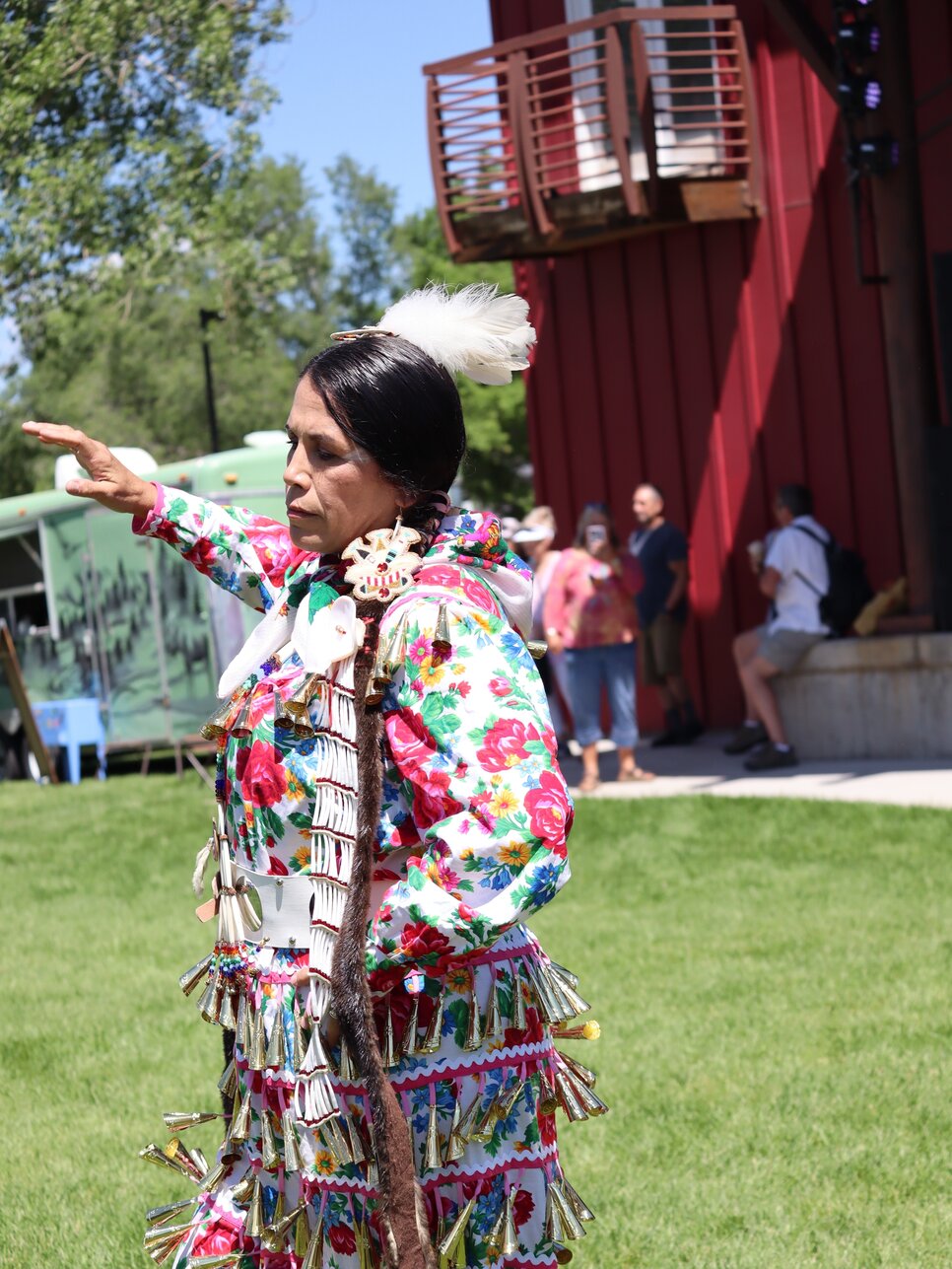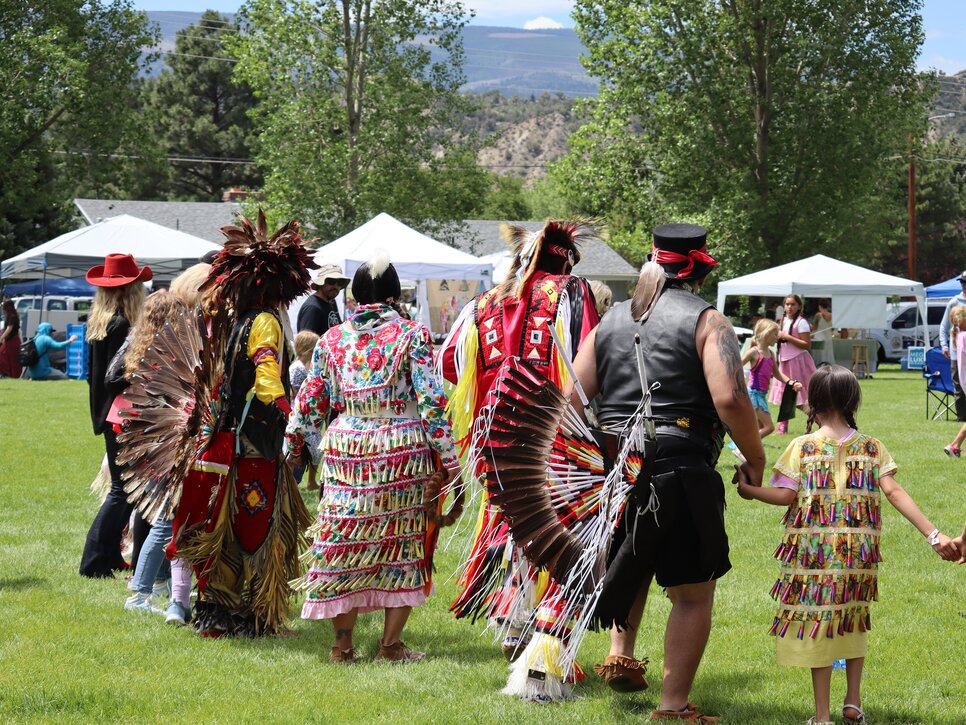Indigenous wisdom from the Four Directions
share

EAGLE, Colo. — The tipi — built from wood poles and canvas, sitting open for anyone to enter and listen to a story, learn about tradition or hear wisdom from an Indigenous elder — greeted visitors to Eagle Town Park.
For three days, Indigenous tribes from the north, south, east, and west assembled for the Indigenous Wisdom Gathering to revel in horse painting, traditional dancing, drumming, storytelling and an Indigenous-led hike through Bush Creek Open Space.
“The tipi is up because it catches people’s attention … it helps draw people who want to know what’s going on,” said Dave Ventimiglia, executive director of Tipi Raisers.
“If you’re with a traditional person, there are so many teachings. And if people linger, it’s a place to start a discussion about some traditions as each pole has a significance of value,” he said.

Trayton White Butterfly with Tipi Raisers displays horse painting.
Photo: Mona Cedillo, Rocky Mountain PBS.
Having a tipi present during the second Indigenous Wisdom event during Eagle’s Flight Days served as a physical reminder that Indigenous people are still alive in the United States.
Ventigimila brought horses, elders and youth with Tipi Raisers, an organization that works on reservations to address poverty and empower youth.
“We’ve learned that communities and families are healthier when there’s this broad range [of ages],” said Ventimiglia.
Elder Joseph Medicine Robe taught Indigenous culture and tradition, playing the flute, and storytelling. Robe taught multiple sessions at the three-day gathering to make himself available for all newcomers.
Unlike most Native traditions that restrict teachings to Indigenous people, Robe and others opened up their teachings to both Native and non-Native people.

Joseph Medicine Robe teaches the importance of the tipi.
Photo: Mona Cedillo, Rocky Mountain PBS
Photo: Mona Cedillo, Rocky Mountain PBS
“We are all children of the Great Spirit — that division only happens in the human mind,” said Robe.
“When we create divisions of this and that. If we are going to grow and evolve as a society we need to go beyond those human mental constructs that were ingrained into us,” he said.
Rocky Mountain Indigenous Dancers performed dances from the Navajo, Apache, Lakota, Dakota, Sioux and Alaska nations. The various dance performances are part of imparting the wisdom and teachings from all tribes, said Thomas Yellowhorse-David, a performer with the troupe.
Yellowhorse-David is part of what is called the Seventh Generation.
The Seventh Generation refers to the Iroquois concept of remembering the seven generations that came before and the seven generations who will come after.
People who identify as Seventh Generation practice a lifestyle focused on sustainability, protecting the land, sky and water, and embracing Indigenous wisdom and traditions.
Women and girls of all ages wearing bright-colored shawls draped with fringe performed the “Fancy Shawl,” a dance typical of the Northern Yakama and Chickasaw tribes. The performers mimic butterflies through their steps.

The jingle dress, originated by the Objibwe, is known for the metal cones on the dress, known as “ziibaaska’iganan”. The distinct jingle sound emanates from 365 cones, each covered with a prayer, sewn into the dress. Women and children perform in bright-colored regalia, stepping in a zig-zag fashion, meant to signify how someone maneuvers through life.
Photo: Mona Cedillo, Rocky Mountain PBS
“My biggest lesson is about being respectful towards others and understanding,” said Trayton White Butterfly, 24, a longtime volunteer with Tipi Raisers.
Butterfly worked with the horses and helped teach the tradition of horse painting.
Symbols such as a circle over the eye of the horse were meant to encourage people to focus on wisdom.
Other symbols such as the medicine wheel, also known as the sacred hoop, symbolize the four directions. Each direction is meant to encourage following various traditions and wisdom, which may vary according to each tribe.
Robe believes there will always be a need for wisdom keepers.
“We are spiritual beings, and we can do more than help each other, we can uplift society. Instead of going in the direction of war, divisions, oppression, poverty, or injustice, you can go another route to sharing balance, respect, and honoring life,” he said.

Rocky Mountain Indigenous Dancers lead the people in a friendship dance.
Photo: Mona Cedillo, Rocky Mountain PBS
Robe encouraged adults to step up on all fronts, and said it didn't matter if it was parents, uncles, aunties, grandparents, educators or social community leaders.
“Somebody who cares about somebody, you see them suffering, they’re laying down on the ground, you open up and pick them up, dust them off, get them back on their feet,” said Robe.
Last winter, Ventimiglia said, three elders froze to death in their South Dakota homes and he fears younger generations are losing their ability to be compassionate people.
When meals are served, Tipi Raisers have all age groups wait until the elders have gotten their food first.
Ventimiglia believes this is real wisdom.
“Humans are humans and there’s wisdom passed down through the generations of people,” he said.
“That’s the best of humanity. When wisdom — really healthy and structured wisdom — is passed down from generation to generation.”
Correction: A previous version of this story included a misspelling of Joseph Medicine Robe's name. We have fixed the typo.
Correction: A previous version of this story included a misspelling of Joseph Medicine Robe's name. We have fixed the typo.